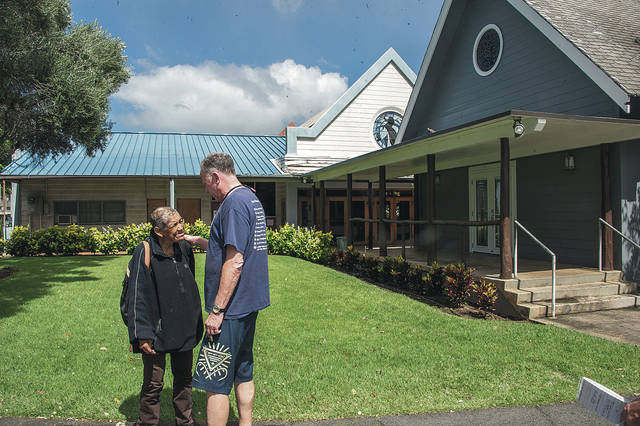Churches help homeless with laundry, other needs

DENNIS ODA / DODA@STARADVERTISER.COM
Pastor Gregory Johnson of St. Mary of Moiliili Episcopal Church talks about the church’s efforts to help the homeless during a panel discussion on “Ministries That Go Beyond Food and Shelter.”

CRAIG T. KOJIMA / AUG. 19
Above, Johnson talks with a homeless woman in front of St. Mary’s Soldier Chapel.


St. Mary of Moiliili Episcopal Church near the old stadium park might only have 70 worshippers on an Easter Sunday, but pastor Gregory Johnson says his small congregation provides a multitude of services to the homeless and working poor — including much-needed laundry assistance.
He often refers to his church as “little old St. Mary,” but it’s a point of pride. “You don’t need to be a big giant community to make a difference in the community,” Johnson said.
Two years ago St. Mary started a “one-stop pop-up” service every month in partnership with a plethora of providers, including the Institute for Human Services, the University of Hawaii medical school and the Legal Aid Society. Hot meals are served, and bags of groceries are handed out. The number of people served has grown to 90 from 30.
Churches with aging congregations and small numbers that want to help the homeless don’t have to do all the work themselves and can ask agencies for help, he said. Outreach programs might seem like an overwhelming, impossible thing to people, “but with others to help, it is possible. … We can do it together.”
Wearing his signature T-shirt and Bermuda shorts, Johnson was in full pep rally mode while speaking at a workshop titled “Ministries That Go Beyond Food and Shelter” presented April 30 at a Faith Summit on Homelessness at First Assembly of God in Moanalua. The gathering was sponsored by IHS, interfaith groups and the governor’s office.
Johnson’s church was awarded IHS’ inaugural Peanut Butter Ministry award, named in honor of IHS founder Claude du Teil, last year for its pop-up programs. St. Mary also partners with several other small churches that can’t manage an outreach program on their own but can provide volunteers. Anyone, no matter what their age, can donate much-needed clothing, toiletries and other supplies, he said.
Don't miss out on what's happening!
Stay in touch with breaking news, as it happens, conveniently in your email inbox. It's FREE!
“When you find something that works, duplicate it over and over again. It works in Moiliili,” he said.
Johnson said churches can also offer just one kind of service versus a variety. “(But) if you don’t do anything else,” start a much-needed laundry assistance program, he advised. It allows the poor to spend their money on other necessities. It doesn’t take a lot of money or time, he added. Every holy day like Easter, St. Mary hands out packets of detergent pods and a roll of quarters at Launderland 1 on South Beretania Street.
“We all have people who think homeless are that way because they deserve to be,” Johnson said.
He brings skeptics to the laundry, and “they see people weep — chicken skin — weep. It’s something so simple. You bring the love of Christ right into their midst, into their hearts, and they’re just overwhelmed.”
In response to criticism that providing the service enables the homeless in their lifestyle, he counters with Scripture: “What you do unto the least of these, you do this unto me” (Matthew 25:40).
A similar program, Laundry Love, is a branch of the national nonprofit campaign. Its director is Craig Shoji, a member of First Presbyterian Church of Honolulu. “The homeless felt people treated them with greater respect with clean clothes,” he said.
The church started Laundry Love 18 months ago at Waimanalo Laundry Services, and 733 families have been served this year alone. The church provides about $1,000 in quarters every month, and businesses contribute volunteers, food, toiletries and supplies, Shoji said.
Owner Ericka Drayton said she closes her laundry to other customers for several hours in addition to donating water, electricity and labor. Her staff and 20 volunteers wash and dry more than 1,000 loads (between 18 and 60 pounds each) at every event. The homeless are “so thankful and so grateful” to be able to come, she added. Visit 808ne.ws/laundrylov Opens in a new tab.



